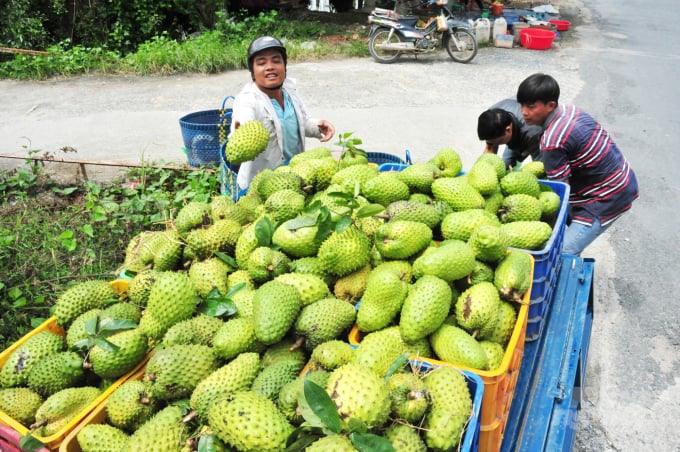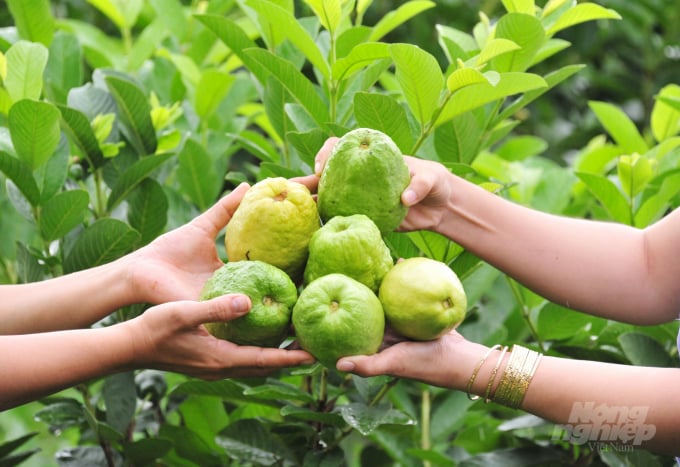May 24, 2025 | 16:26 GMT +7
May 24, 2025 | 16:26 GMT +7
Hotline: 0913.378.918
May 24, 2025 | 16:26 GMT +7
Hotline: 0913.378.918
Can Tho city Sub-Department of Cultivation and Plant Protection have recently coordinated with the Districts' Department of Agriculture and Rural Development to organize the workshop on "Organic production, practice and development orientation".
Can Tho is a key agricultural production province in the Mekong Delta. The organic agricultural production in the city is also recommended and promoted by the local government. According to Mr. Tran Thai Nghiem, Deputy Director of Can Tho City Department of Agriculture and Rural Development, Can Tho city currently has nearly 80,000 hectares of rice, 23.5 thousand hectares of fruit crops and 3,000 hectares of aquaculture land. The local farmers still rely on using chemical fertilizers and pesticides, so organic agriculture production is still very limited.

Workshop on "Organic production, practice and development orientation" organized by Can Tho City Sub-Department of Cultivation and Plant Protection. Photo: Le Hoang Vu.
Organic agricultural production is currently considered a necessary trend in agricultural production of Can Tho as well as other regions in Vietnam. Organic agricultural production aims to meet the increasing demands of domestic and foreign consumers; while contribute to the protection of the ecological environment and human habitat.
The agricultural sector of Can Tho city is recommending farmers and farms to produce in the direction of organic agriculture to meet VietGAP, GlobalGAP standards. Additionally, some businesses have boldly invested in organic agriculture; they eliminated the use of chemical fertilizers and pesticides in production, and use organic fertilizers and bio-organic drugs as replacement.
Organic agriculture is also a social concern as well as a premise for the agricultural sector to restructure production in the near future. However, developing organic agriculture is not a simple task that can be completed immediately. It is a transitional process, requiring the cooperation between of various branches and levels, as well as the persistent determination of farmers.

Organic agricultural production is the current necessary direction for Vietnamese agriculture. Photo: Le Hoang Vu.
Mr. Pham Van Quynh, former Director of Can Tho City Department of Agriculture and Rural Development, said that in order to have further breakthrough in the development of organic agriculture, ia long-term orientation and strategy is extremely important. Because this is not a simple conversion of conventional agricultural production to organic agricultural production; long-term sustainability must be prioritized. When it comes to sustainability, we must start from land and water sources, then we can apply techniques, organic fertilizers, and biological pesticides, thereby creating sustainable high-quality products.
According to Mr. Quynh, countries around the world are focusing on high organic agricultural products including the Europe, the US, Australia, Japan, etc. On the other hand, organic agricultural production in Vietnam is still limited and fail to meet the requirements of many markets around the world. Hence, the agricultural sector needs to assess the market, implement planning to organize large-scale organic agricultural production areas with businesses as the spearhead in linking consumption for farmers.
Furethermore, organic agricultural production requires a source of bio-organic fertilizers as well as natural measures to control diseases on plants and animals. Farmers must know how to utilize by-products from cultivation and livestock to create organic fertilizers that can serve crops or livestock, in addition to reducing costs, protecting the environment, the community health and improving income for farmers.

Can Tho City is recommending farmers and farms to follow organic agricultural production meeting standards such as VietGAP, GlobalGAP, etc. Photo: Le Hoang Vu.
Dr. Ngo Thi Thanh Truc, Lecturer at the Faculty of Economics, Can Tho University, said that the global market will gradually have higher demand for safety, clean, and environmentally friendly products. Therefore, if our agricultural products fail to meet this basic demand, it will prove to be a big obstacle in promoting the development and formation of organic agricultural production in the future.
Highly efficient organic agricultural production requires the government to promote the following actions: developing growing area codes, changing the production mindset from chemical fertilizers and pesticides to biological organic replacements, build a chain of products trading and consumption, and so on.
Organic agriculture is considered an environmentally friendly trend that aims towards ecological balance, contributing to the protection of soil resources, ecosystems and human health. In economic terms, organic agricultural products are presently favored by consumers at higher prices, which can be beneficial to the environment while bringing high economic value. However, organic agricultural production is limited. According to statistics, the organic agriculture area in Vietnam currently accounts for only approximately 0.4% of the total agricultural land area.
Translated by Nguyen Hai Long

(VAN) The People's Committee of Tra Vinh province has approved an adjustment to the investment policy for the Green Hydrogen Plant project, increasing its area to approximately 52.76 hectares.
![Reducing emissions from rice fields: [2] Farmers’ commitment to the soil](https://t.ex-cdn.com/nongnghiepmoitruong.vn/608w/files/news/2025/05/05/dsc08881jpg-nongnghiep-140632.jpg)
(VAN) Clean rice cultivation model in Thuong Tan commune, Bac Tan Uyen district, is assisting local residents in achieving sustainable agriculture by substantially reducing costs, increasing productivity, and protecting the environment.

(VAN) At the conference to disseminate Resolution No. 68, AgriS introduced its digital agricultural ecosystem and reaffirmed its commitment to accompanying the Government in promoting private sector development and sustainable agriculture.

(VAN) 'Blue Ocean - Blue Foods' initiative is designed to restore marine ecosystems and establish sustainable livelihoods for local communities by cultivating a minimum of 1,000 hectares of cottonii seaweed in the first three years.
/2025/05/21/4642-3-112707_603.jpg)
(VAN) The V-SCOPE project has made direct contributions to three out of six pillars of the Comprehensive Strategic Partnership between Vietnam and Australia.

(VAN) Facing the threat of rabies spreading to the community, Gia Lai province urgently carries out measures to vaccinate dogs and cats on a large scale.

(VAN) Disease-free livestock farming not only protects livestock herds but also stabilizes production and livelihoods for many farmers in Tuyen Quang.